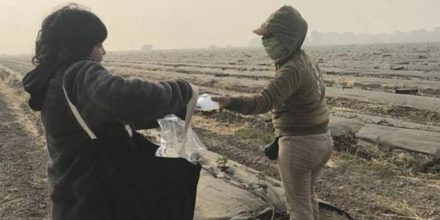
Cal/OSHA has issued a reminder to employers that they are required to protect their outdoor workers from unhealthy air due to wildfire smoke.
Cal/OSHA’s Protection from Wildfire Smoke emergency regulation put in place in August 2019 was made permanent in February 2021. For the safety of your workers and to comply with the regulation, it’s important that you follow the regs and know when you will need to take action to protect them from outdoor smoke.
The regulation applies when the Air Quality Index (AQI) for airborne particulate matter 2.5 microns (PM2.5) is 151 or greater in an area where employees are working outdoors. Here are the details:
Identification ― When wildfire smoke affects a worksite, employers must monitor the AQI for PM2.5. Employers can monitor the index using the following websites:
- S. EPA AirNow
- S. Forest Service Wildland Air Quality Response Program
- California Air Resources Board
- Local air pollution control district websites or local air quality management district websites.
Communication ― Employers must implement a system for communicating wildfire smoke hazards in a form readily understandable by all affected employees, including provisions designed to encourage employees to inform the employer of wildfire smoke hazards without fear of reprisal.
Training and instruction ― Employers with outdoor workers need to provide training that covers at least:
The health effects of wildfire smoke.
The right to obtain medical treatment without fear of reprisal.
How employees can obtain the current AQI for PM2.5.
Possible actions they must take if the AQI exceeds 150 PM 2.5.
Options for protecting workers ― The regulation provides three ways employers can protect their workers:
- Modifications― If possible, employers should implement modifications to the workplace, in order to reduce exposure. Examples include providing enclosed structures or vehicles for employees to work in, where the air is filtered.
- Changes to procedures and schedules― Another option is to change work procedures or schedules. Examples include changing the location where employees work or reducing the amount of time they work outdoors or exposed to unfiltered outdoor air.
- Respiratory protection― Employers also have the option to provide proper respiratory protection equipment, such as disposable respirators, for voluntary use without fit-testing AQI PM2.5 levels are below 500.
To filter out fine particles, respirators must be labeled N-95, N-99, N-100, R-95, P-95, P-99 or P-100, and must be labeled as approved by the US National Institute for Occupational Safety and Health.
If the AQI PM2.5 is above 500, respirator use is required, fit-testing and a medical examination prior to use would be mandatory.
Resources – The Western Center for Agricultural Health and Safety website (through UC Davis funded by CDC/NIOSH) has checklists for employers, training handouts (poster for discussion), images explaining the health effects and monitoring the AQI. You can download the individual handouts at the links below.
Cal/OSHA has created training videos on wildfire smoke protection and the use of N95 respirators.
Guidance for employers and workers on wildfire smoke is available on Cal/OSHA’s web page along with frequently asked questions about N95 masks. Cal/OSHA’s Training Academy offers free resources in English and Spanish.


